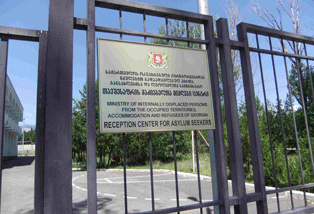Una Brogan, Migreurop researcher in Georgia
The history of the Universal Declaration of Human Rights is intimately tied in to the rights of migrants and refugees. More than sixty years ago, following a world war, it was seen as vital to ensure the rights of people fleeing political persecution and conflict. As wars and repression continue throughout the world, it remains of crucial importance to ensure the safety of those people fleeing conflict zones or authoritarian regimes.
Georgia passed a law regulating the legal status of refugees and asylum seekers as well as the grounds for granting, suspending and cancelling refugee status in 1998. In 1999, Georgia signed the Convention on the Status of Refugees and a further law on Refugee and Humanitarian status was adopted December 2011.
Since 2010, asylum seekers and refugees have been offered accommodation at a reception centre in Martkopki, whose construction was funded by UNHCR, the US State Commission and the European Commission. It is an open accommodation centre with 60 places and is currently half full.. At present its running costs are split between UNHCR and the Georgian government, but the goal is to entirely devolve responsibility to Georgian authorities in the coming years.
In 2012, the centre housed migrants from Kazakstan, Russia, Iran, Sri Lanka, Bangladesh, India, Egypt, Morocco, Nigeria, Cameroon and other countries. It is a modern, well-equipped building offering all necessary facilities to the people living there, who are free to come and go as they please and also to undertake paid employment to supplement their monthly allowance of 80 GEL. However, for most of the migrants in the centre, their stay in Georgia has not always been so comfortable.
Robert, from Cameroon, was arrested on arrival at Tbilisi airport for possession of a fake passport. He had needed to hide his identity in order to leave his home country, where he was under threat because of his political activities. Although he immediately requested to make an asylum claim, he was put on trial for holding a falsified document. He spent 6 months in prison before paying a 750 GEL fine for his release and finally filing his claim for asylum. Another man he knows from Cameroon was not offered the possibility to pay a fine and was sentenced to 7 years in prison.
One of the central rights of asylum seekers is the right to cross state borders without necessarily being in possession of the required documents. This is because politically-persecuted people and those fleeing conflict zones may be unable to follow the normal procedures for entry into a country. Therefore, a person arriving 'illegally' in a country, when intercepted by border police, should be allowed to state his/her claim for asylum before he/she is judged for illegal border-crossing or possession of fake documents. Currently in Georgia, this right is rarely respected, since most of the people now claiming asylum in the Martkopi centre have spent 6 months or more in prison before being able to make their claim for refugee status.
On the one hand, the Martkopi centre sets a good example to Europe (where asylum seekers are more often detained than placed in open centres) of how to offer protection and respect the rights of people seeking asylum. However, the excessively strict penalties for illegal border crossing creates the tragic situation where potentially innocent people are placed in prison, sometimes for many years, before being able to file their claim for asylum.
News
December 13, 2023
Ethnic minorities outside the peace dialogue
November 6, 2023
‘Peace’ agenda of political parties
Popular
Articles
February 13, 2024




